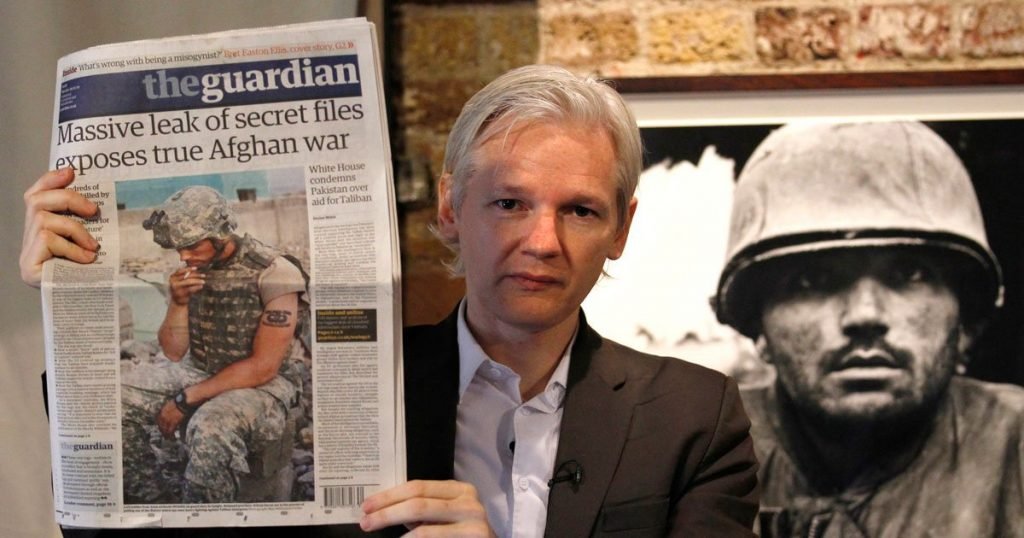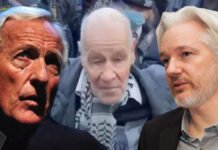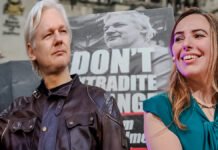The WikiLeaks founder will appear in a London court to fight attempts by the American authorities to make him answer charges of espionage.
The most senior judge in England and Wales, Ian Duncan Burnett, the judge best known for presiding over and blocking the extradition to the US of activist Lauri Love, a student accused of hacking into US government websites, will join Lord Justice Timothy Holroyde at the U.S. appeal hearing against Julian Assange this week.
Burnett, known as Baron Burnett of Maldon, was the High Court justice who on humanitarian grounds overturned a lower court ruling that British activist Lauri Love should be extradited to the United States. Burnett ruled in February 2018 that Love’s extradition would be “oppressive by reason of his physical and mental condition.”
Burnett and Mr Justice Duncan Ouseley said in their decision that, “We accept that the evidence shows that the fact of extradition would bring on severe depression, and that Mr Love would probably be determined to commit suicide, here or in America.”
Instead, they recommended that Love be tried in the United Kingdom on charges of hacking into U.S. government computers. Unlike Love, Assange is accused of no crimes in Britain. But like Love, he has been deemed (by the magistrate’s court) at high risk of suicide if he were to be extradited to the United States.
Burnett has presided over some of the most high profile cases in Britain in recent years, including the 1987 Kings Cross fire, the inquiry into the convictions of the Guildford Four and Maguire Seven, the 1997 Southall rail crash and 1999 Ladbroke Grove rail crash inquiries and the 1997 inquest into the deaths of Diana, Princess of Wales, and Dodi Fayed.
In contrast Lord Justice Timothy Holroyde, the other High Court judge reversed an earlier court order to bar the U.S. from appealing Julian Assange’s medical issues.
The U.S. challenged that ruling and in an Aug. 11 High Court hearing, Holroyde overturned the earlier court decision, siding with the U.S. argument that Baraitser’s finding on Assange’s health could be appealed.
That will be the central argument in the two-day hearing beginning next Wednesday at the Royal Courts of Justice in London. The U.S. says Assange is not too ill to be extradited and has accused him of being a malingerer.
Both judges will sit on the bench for the two-day U.S. appeal in the extradition case of WikiLeaks publisher Julian Assange at the High Court in London, according to a spokesman at the Royal Courts of Justice.
If liberty means anything at all, it means the right to tell people what they do not want to hear.
― Atributed George Orwell

The story of how we got here is as long as it’s tragic.
Julian Assange is regarded by many as a hero who uncovered war crimes and corruption. The embodiment of modern investigative journalism, dealing with huge amounts of leaked data provided by whistleblowers for publication in the public interest.
In July 2010, WikiLeaks, together with several media outlets, such as The Guardian, New York Times, published more than 90,000 US military documents related to the War in Afghanistan.
These included previously unreported details about civilian deaths, friendly-fire casualties, US air raids, al-Qaeda’s role in the country, and nations providing support to Afghan leaders and the Taliban.
Among the most notorious material published by WikiLeaks is the “Collateral Murder” video, released in 2010. It depicts the infamous 2007 episode in Baghdad where US Apache helicopter personnel are recorded enthusiastically slaughtering a dozen Iraqis on the ground, including two Reuters journalists – a fitting hint, perhaps, as to the existential perils of journalistic efforts to document the truth.
In Assange’s case, his crime is just that: telling the truth in contravention of an official narrative of heroic, world-saving interventions by the US military.
WikiLeaks shot to fame soon after the website released that 39-minute video.
The footage leaked by private Chelsea Manning led to global outrage, reigniting a debate over the US’s occupation of Iraq and wider presence in the Middle East.
The July 2007 attack was made public with the video being shown over mainstream media, a move that angered the Pentagon so much, it had drawn up a report identifying the whistleblower website as a threat to national security. The US defence department was embarrassed when that confidential report appeared on the Wikileaks site alongside a slew of other military documents.
The release of the video from Baghdad also comes shortly after the US military admitted that its special forces attempted to cover up the killings of three Afghan women in a raid in February by digging the bullets out of their bodies.
The Pentagon blocked an attempt by Reuters to obtain the video through a freedom of information request. Wikileaks director Julian Assange said his organisation had to break through encryption by the military to view it.
After the 2010 leaks, the United States government launched a criminal investigation into WikiLeaks.
In November 2010, Sweden issued an international arrest warrant for Assange over allegations of sexual assault.
Assange said the allegations were a pretext for him to be extradited from Sweden to the United States because of his role in publishing secret American documents.
The Australian whistleblower originally faced four sex-related charges in Sweden after an August 2010 visit to the country.
The claims of misconduct triggered a years-long extradition battle, which Assange eventually lost in the UK’s Supreme Court in 2012.
After failing in his battle against extradition to Sweden, he breached bail and took refuge in the Embassy of Ecuador in London in June 2012. He was granted asylum by Ecuador on the grounds of political persecution, with the presumption that if he was extradited to Sweden, he would be eventually extradited to the US.
In August 2015, the statute of limitations on three of the four allegations lapsed.
Assange had consistently denied the allegations, claiming it was a ploy by Washington to get him extradited to the United States.
In April 2019, Ecuador’s new President Lenin Moreno said that the 48-year-old Australian had violated the terms of his asylum and he was expelled from the embassy.
On 11 April 2019, Assange’s asylum was withdrawn following a series of disputes with the Ecuadorian authorities. The police were invited into the embassy, he was then promptly arrested by British authorities.
In November 2019 Sweden dropped the rape allegations and the investigation, deputy director of public prosecution Eva-Marie Persson made the announcement at a news conference in Stockholm.
Although officials said they believed the women’s claims to be “credible,” they have now said that there does not appear to be enough evidence for an indictment. This follows a June decision by a Swedish court that Assange should not be detained.
Many questions had been asked about the case including Sir Keir Starmer’s involvement as the U.K. Director of Public Prosecutions at the time.
“what were his dealings in the Julian Assange case.” “Starmer should be challenged, what does he know?”
Ken Loach went on to State: ” this should be a test for him! Starmer speaks of openness in his dealings, well let him be open about this, and let’s hear what he says about the torture and the illegal oppression of Julian Assange.”
Assange faced a new court trial in February 2020 concluding in October 2020, while being held on remand at the maximum-security Belmarsh prison in southeast London.
He was found guilty of breaching the Bail Act and sentenced to 50 weeks in prison.
The United States government unsealed an indictment against Assange, related to the leaks provided by Chelsea Manning. On 23 May 2019, the United States government further charged Assange with violating the Espionage Act of 1917, They requested extradition to the United States.
In January 2021, the high court in London ruled he could not be extradited to the US because of concerns over his mental health and the risk of suicide in the US.
In August Julian Assange lost a high court battle to prevent the US government expanding the grounds for its appeal against an earlier refusal to allow his extradition to face charges of espionage and hacking government computers.
The investigation into Assange was reopened in May 2019 following his dramatic removal from Ecuador’s embassy in central London the previous month. Swedish authorities had previously suspended the probe in 2017.
During Assanges’s exile, he and Wikileaks continued to anger the American government or the power behind the government.
During the 2016 U.S. election campaign, WikiLeaks published confidential Democratic Party emails, showing that the party’s national committee favoured Hillary Clinton over her rival Bernie Sanders in the primaries.
In 2018, Special Counsel Robert Mueller charged twelve Russian intelligence officers with computer hacking and working with WikiLeaks and other organisations to disseminate the material. Assange said that the Russian government was not the source of the documents.
The UK now have the unenviable task of extraditing Julian Assange or carrying out justice.
Editors from newspapers including The Washington Post and The New York Times, as well as press freedom organisations, criticised the government’s decision to charge Assange under the Espionage Act, characterising it as an attack on the First Amendment to the United States Constitution, which guarantees freedom of the press.
The Assange case creates a precedent that mortally threatens freedom of the press in Britain. If Assange is extradited then any journalist who publishes information that the American authorities deem to be classified, however well-known or harmless it may be, will risk being extradited to face trial in America. The US secretary of state, Mike Pompeo, says that non-Americans like Assange do not enjoy First Amendment rights to free expression.
“If Julian Assange is extradited to the US, the very idea of a journalism that’s free is lost. No journalist who dares to challenge rapacious power and reveal the truth will be safe.” -John Pilger
This is has nothing to do with justice, attempts to extradite Assange is nothing more than an act of revenge carried out by an embarrassed, United States, a military who through Julian Assange now want to convey a message to all journalists, there is no Freedom of speech, no holding to account the powers of government or those that carry our war in their name there is only the official narrative, truth has no place in a modern democracy.
Support Independent Journalism Today
Our unwavering dedication is to provide you with unbiased news, diverse perspectives, and insightful opinions. We're on a mission to ensure that those in positions of power are held accountable for their actions, but we can't do it alone. Labour Heartlands is primarily funded by me, Paul Knaggs, and by the generous contributions of readers like you. Your donations keep us going and help us uphold the principles of independent journalism. Join us in our quest for truth, transparency, and accountability – donate today and be a part of our mission!
Like everyone else, we're facing challenges, and we need your help to stay online and continue providing crucial journalism. Every contribution, no matter how small, goes a long way in helping us thrive. By becoming one of our donors, you become a vital part of our mission to uncover the truth and uphold the values of democracy.
While we maintain our independence from political affiliations, we stand united against corruption, injustice, and the erosion of free speech, truth, and democracy. We believe in the power of accurate information in a democracy, and we consider facts non-negotiable.
Your support, no matter the amount, can make a significant impact. Together, we can make a difference and continue our journey toward a more informed and just society.
Thank you for supporting Labour Heartlands












